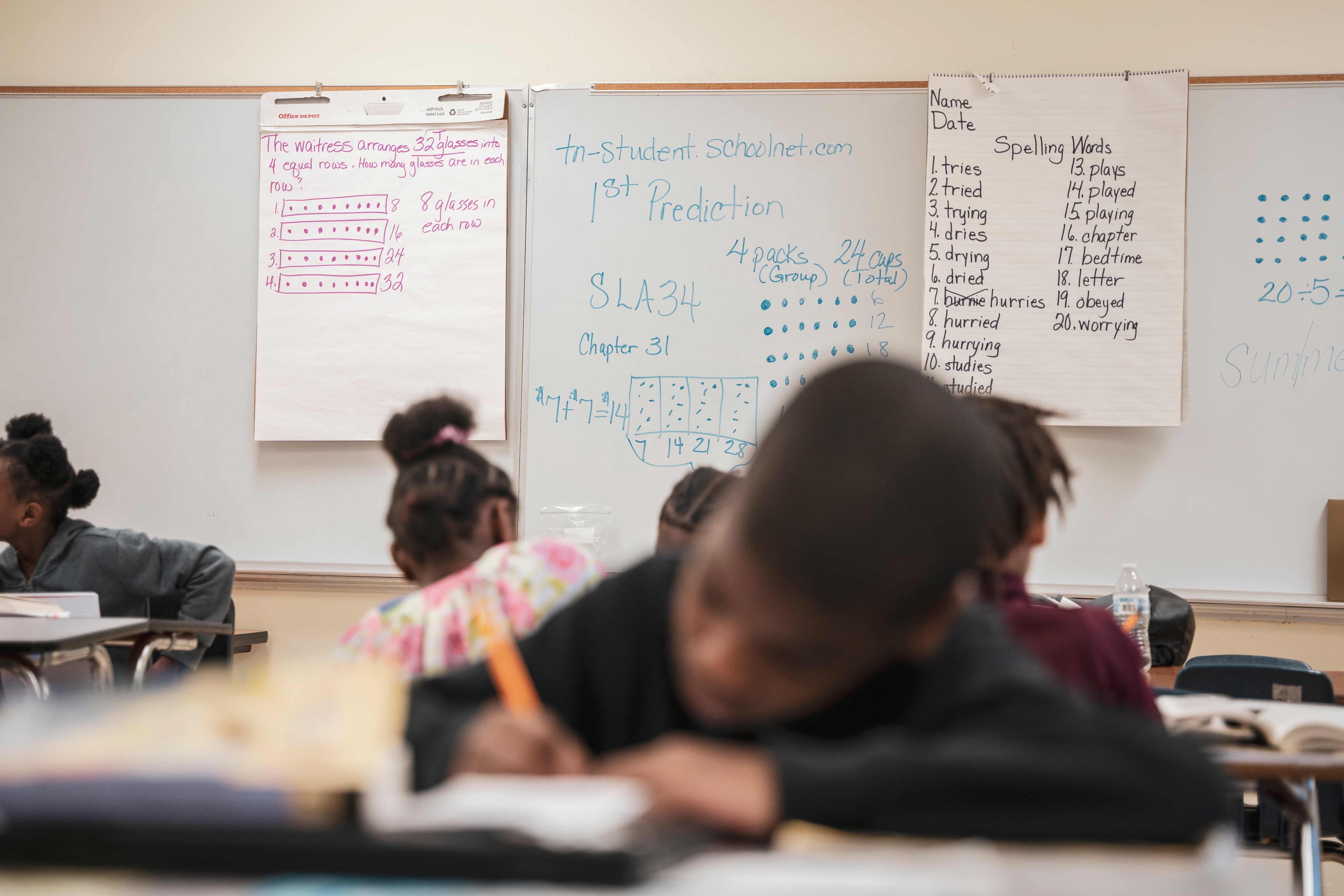Sign up for Chalkbeat Tennessee’s free daily newsletter to keep up with statewide education policy and Memphis-Shelby County Schools.
Some 60% of Tennessee third-grade students scored below proficiency in English language arts on 2024 state tests. Fewer than than 1% of them were retained under the state’s reading and retention law, and about 2.5% are no longer enrolled in public schools, according to new data.
Among fourth graders who had been promoted by receiving tutoring during the 2023-24 academic year under the same law, just over 1% were held back this school year, while at least 4% have left their public school.
The findings, presented by Tennessee’s chief academic officer to the State Board of Education on Thursday, show some of the effects of Tennessee’s 2021 reading intervention and retention law aimed at accelerating learning after the pandemic.
The controversial statute was pushed by Gov. Bill Lee, who said he wanted to draw a hard line to “stop the cycle of passing without preparation.” The legislature has since approved several revisions to loosen the policies and provide more pathways to promotion for students who don’t test as proficient readers.
State leaders are ‘encouraged’ by tutoring and summer program data
The big question is whether students are becoming better readers with the state’s interventions.
That includes summer programming, which began in each school system in 2021 to mitigate the effects of disruptions to schooling during the pandemic. About 121,000 students went that first year, and participation has leveled off to about 90,000 in subsequent years.
Chief Academic Officer Kristy Brown, in her presentation to the board, said attendance rates improved for recent summer programs, indicating that parents are finding value in them.
As far as academics, she said: “What we’re really seeing is the effects of decreased summer slide, or the lack of it, for students who are participating, compared to those who are not.”
Summer slide, referring to when students’ academic proficiency regresses during summer break, is a common phenomenon, especially for historically disadvantaged populations.
As for required small group tutoring, which younger students receive weekly during the school year if they don’t meet expectations on state tests, Brown said students testing in the bottom level, called “below” proficiency, are moving in the right direction.
In addition, almost half of the 12,260 fourth graders who received required tutoring in 2023-24 showed improvement as the year progressed. Over 14% of them scored as proficient on their TCAPs last spring, and nearly 33% met the threshold for showing adequate growth based on a state formula.
The data is the first available for fourth-graders who started receiving additional support after scoring below proficiency in the third grade.
“To finally have the numbers — to see that the needle appears to have been moved in a positive way like that — I was glad to see,” said Ryan Holt, a member of the state board.
Several other board members also said they were “encouraged” by the data.
Brown, the state’s academic chief, cautioned that gains can’t be traced at this point to any single part of the state’s reading interventions.
“It’s a combination of the things that we’ve done,” she said, “with professional learning for teachers, and summer programming, and tutoring, and those things customized for those students to see the gains that I think we’ve seen in Tennessee.”
Many educators and parents have been less enthusiastic.
The high-stakes testing was well-intended, they say, but it’s taken an emotional toll on many of Tennessee’s youngest students, affecting their self-confidence and their feelings toward school.
The legislature’s most recent revisions to the law were intended to give parents and educators more input into retention decisions.
Many students facing retention used alternative pathways to promotion
After the 2023-24 school year, most of the nearly 44,000 third graders who were at risk of retention used other pathways to promotion.
Nearly 27% were exempted for various reasons, including having a disability or suspected disability that impacts their reading; being an English language learner with less than two years of ELA instruction; and having been previously retained.
Over 4% retook the test at the end of the academic year and scored as proficient.
Others were promoted through a combination of tutoring and summer program participation.
For the 12,260 fourth graders who participated in tutoring last school year, over 14% scored as proficient on the state’s assessment in the spring.
Over 32% met the state’s “adequate growth” measure that’s tailored to each student. It’s based on testing measurements that the state uses to predict the probability that a student can become proficient by the eighth grade, when they take their last TCAP tests.
And nearly 44% of at-risk fourth graders were promoted by a new “conference” pathway that lawmakers approved on the last day of the 2024 legislative session. It allows the student to be promoted if their parents, teacher, and principal decide collectively that it’s in the child’s best interest.
Any fourth grader promoted to the fifth grade via the conference pathway must receive tutoring in the fifth grade.
Marta Aldrich is a senior correspondent and covers the statehouse for Chalkbeat Tennessee. Contact her at maldrich@chalkbeat.org.







